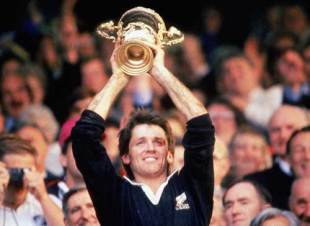World Cup 1987
New Zealand dominate inaugural tournament
David Kirk lifts the William Webb Ellis trophy
© Getty Images
World Cup No. 1
May 22 - June 20, 1987
Hosts: Australia & New Zealand
Teams: 16
Format
Sixteen national sides converged on Australia and New Zealand for the inaugural Rugby World Cup in May 1987. Thirty-two matches were played in total, at 11 stadiums, nine in New Zealand and two in Australia. The teams were arranged in four pools of four teams with representation from Africa, the Americas, Asia, Europe and Oceania. Teams played each other in a league format in the Pool stages, and were awarded two points for a win, one for a draw and zero for a loss. The top two nations of each pool advanced to the quarter-finals. There, the pool winning sides played knock-out matches against pool runners-up in the, before two semis and a final.
Pre-tournament hype
This was the first global gathering of the world's rugby tribes, and as such was keenly anticipated. While it cannot be said that the tournament captured the world's imagination, it was an oval-shaped feast for rugby fans around the globe. There was no qualification process to reach the tournament, with the 16 nations each being invited by the International Rugby Board. South Africa were notable in their absence, not invited due to the political conditions of the apartheid era.
Pool stages
The first Rugby World Cup match took place between New Zealand and Italy in Pool 3 at Eden Park in Auckland on May 22 in front of 20,000 spectators. New Zealand won the match 70-6, scoring 12 four-point tries. The All Blacks were rampant in the pool stages scoring a total of 190 points in three matches, conceding just 34, with Fiji also qualifying from their group. Australia won Pool 1 with England runners-up, Wales topped Pool 2 with Ireland in second place, and France were victorious in high scoring Pool 4, with Scotland also progressing.
Knock-out stages
New Zealand secured their semi-final spot with a 30-3 win over Scotland at Lancaster Park in Christchurch, and Wales joined them there after a three-try 16-3 win over England at Ballymore in Brisbane. New Zealand won that semi-final comfortably 49-3 scoring eight tries, with John Kirwan and Wayne Shelford grabbing two apiece. In the other half of the draw, France and Australia dispatched Fiji and Ireland respectively to reach the second semi-final. That semi-final, played at the Concord Oval in Sydney, was the game of the tournament with France snatching a last gasp victory 30-24.
The final
The final, played in bright sunshine at Eden Park in Auckland on June 20 in front of 46,000 spectators, was refereed by Kerry Fitzgerald of Australia and won by New Zealand 29-9. Michael Jones, David Kirk and Kirwan scored tries, with Grant Fox kicking one conversion, four penalties and a drop goal for the Blacks. While for France, Didier Camberabero kicked a penalty and converted Pierre Berbizier's try. The victory meant that scrum-half Kirk, captaining the side in hooker Andy Dalton's injury-enforced absence, lifted the William Webb Ellis trophy for New Zealand for the first, and, so far, only time.
Player of the tournament
To say that New Zealand dominated this tournament would be an understatement. This All Black outfit was one of the greatest of all time, stuffed with legendary names such as Kirk, Shelford, Fox, Sean Fitzpatrick and Joe Stanley. This side, famed for its devastating rucking and ruthless finishing, also featured two of the greatest-ever players in their positions, both at the height of their powers. Jones at openside flanker, and Kirwan on the right wing were simply brilliant. The big, crew-cutted winger just shades player of the tournament, thanks to his six tries and the try of the tournament, his 90-yard,stepping and swerving solo effort where he seemingly beat the entire Italian team.
Frozen in time
Despite New Zealand sweeping all before them in this tournament, and Kirwan scoring a wonder-try, the moment of the competition took place in the closing stages of the semi-final between Australia and France in Sydney. With only a couple of minutes remaining, and the scores locked at 24-24, both sides were in all out attack, desperately looking for the points to take them to the final. With bodies lying strewn all over the pitch, France attacked down the right through Denis Charvet, before swinging play back left. Patrice Lagisquet made ground, before Laurent Rodriguez fed fullback Serge Blanco who out-paced four defenders to score in the corner. Didier Camberabero converted from the touchline to make it 30-24, and cap a sensational finish to an all-time classic Rugby World Cup match.
© Scrum.com


